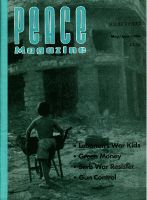
Peace Magazine May-Jun 1994, page 23. Some rights reserved.
Search for other articles by William Christian here
Scion of two Upper Canadian establishment families, George Grant was never establishment. When World War II began, George, 21 and half through his stint as Rhodes Scholar at Oxford, found himself unable to participate as a combatant. Driven by his intense Christian pacifism and his lifelong abhorrence of war, he became an air raid warden and volunteer community worker during the blitz in working class Bermondsey, East London. Twenty-five years later, his hatred of nuclear weaponry, the ultimate expression of technological anti-humanism, prompted him to go public, backing Diefenbaker in opposition to the Pearson government's willingness to allow U.S. nuclear weapons on Canadian soil.
Lament for a Nation (1965) was much more than a tract on an immediate political issue. In it George summed up his thinking to that point on Canadian history, on imperialism and Canadian identity, on the transcendent modern issue of technological determinism and its threat to Christian and humanist values. The book became an immediate best seller and a key document in the emerging struggle for an independent Canadian polity and culture. George, initially attracted by the vigor of the new left, refused to become identified with any political party. Although he never shied away from taking public stands on issues he cared about, he became less overtly political and more conservative.
Never an academic philosopher (supported though he was by academic employment), George was an independent thinker, member of no school. He read, absorbed, and reassimilated the important thinkers, from Plato and St. Augustine to Sartre and Simone Weil, for insight into the central problem of modernity. In this process George emerged as a leading thinker on these issues, with a considerable international reputation.
His writings, wide-ranging but focused, bear the stamp of an original and powerful mind. They are trenchant, challenging, full of arresting formulations. He is the outstanding Canadian moralist of the century. His support in the 1980s for the right-to-life organization, on the abortion issue, came as a disappointment to many. But this view should not diminish our admiration for the brilliant, quirky Canadian who dug so deeply into the modern dilemma, and whose essence is captured in this bulky, uneven, affectionate, and fascinating biography.

Peace Magazine May-Jun 1994, page 23. Some rights reserved.
Search for other articles by William Christian here